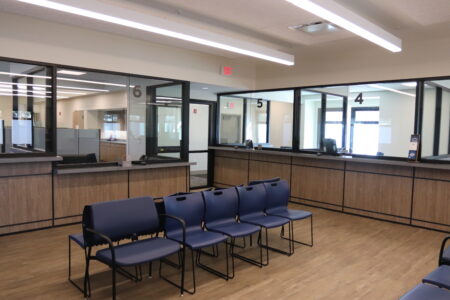Douglas County launches energy savings hub website, urges county residents to take advantage of federal incentives before possible cuts

photo by: Douglas County
Solar panels installed at Douglas County Public Works.
Douglas County has launched a new resource to help people find incentives to make their properties more energy-efficient — but it’s warning that some of these incentives might not last long because of federal cuts.
A new energy hub website created by Douglas County’s Sustainability team says that if people are considering upgrades to their home or building — whether it’s through making a building more resistant to the elements, energy efficiency or renewable energy sources — “now may be the time to act.”
That’s because President Donald Trump’s administration has targeted environmental and climate policies, many of which were rolled out under the Biden administration. House Republicans are now pushing to eliminate or reduce clean energy tax credits, including key provisions from the Inflation Reduction Act.
“(These) tax bills are what made these tax credits available,” said Jamie Hofling, sustainability impact analyst for Douglas County, and they may be on the chopping block.

photo by: Douglas County
Jamie Hofling and Ryan Kuhn with a recently installed small solar system at their home.
The hub lists programs that can help county residents afford energy-efficient projects at their homes or businesses. That might include weatherization projects, like sealing air leaks, adding insulation and upgrading windows and doors; energy-efficient upgrades like smart thermometers, LED lighting and HVAC improvements; or renewable energy sources such as solar power or wind energy.
But many of the programs the site lists are federally funded, such as the Energy Efficient Home Improvement Tax Credit, which is administered by the Internal Revenue Service and offers up to $3,200 annually for energy-efficient upgrades. The hub website says federal incentives like this tax credit may be discontinued as early as the end of 2025, and staff is actively monitoring proposed legislation and planning to update the site as soon as more information is available.
“It’s taking away all of those savings, if those (incentives) were to go away,” Hofling said.
Hofling added that the programs with the Inflation Reduction Act were a part of a 10-year plan with provisions extending through 2031 and beyond for certain tax credits and programs, and it is on track to being cut short.
“It’s very jarring for all of us to (see) progress be made, and people accessing these and using them and seeing the benefits from them, and then a lot of these programs will just be cut short,” Hofling said. “We won’t really get to see what they were capable of if they just barely got off the ground.”
It’s not just homeowners and business owners who would be affected. Hofling also said it would be harder to continue upgrading county buildings without incentives.
The county has been working on sustainability improvements to its own facilities, such as LED lighting at the Extension Office at the Douglas County Fairgrounds and solar panels on some buildings. Hofling previously told county commissioners the solar panels would help offset one-third of those buildings’ anticipated energy consumption.

photo by: Douglas County
Lighting at the Douglas County Fairgrounds was replaced in 2025 with aid from Evergy’s energy efficiency incentive program.
Hofling said despite the potential federal cuts, there are other incentive programs available from utilities and nonprofits.
The electric utility Evergy provides power to over 80% of Kansas residents, she said, and there are multiple programs the company offers, like discounts on energy audits, smart thermostats, heating and cooling upgrades, insulation and air sealing and more for people who meet certain income requirements. It also offers many other programs for small businesses and nonprofits.
In addition, there is an incentive for low-income Douglas County residents through the East Central Kansas Economic Opportunity Center, or ECKAN, which provides free weatherization services and air quality improvements. Priority for this program is given to people over 60, individuals with disabilities and families with children.
Hofling said she hopes all kinds of residents will be able to go to the energy hub and find programs that are available to them.
“I really want to reduce the energy burden on our community so that people have more money to buy other things that they need,” Hofling said. “… There’s so many other things to spend money on, and if we make these upgrades in our homes, we can really reduce that energy burden.”







